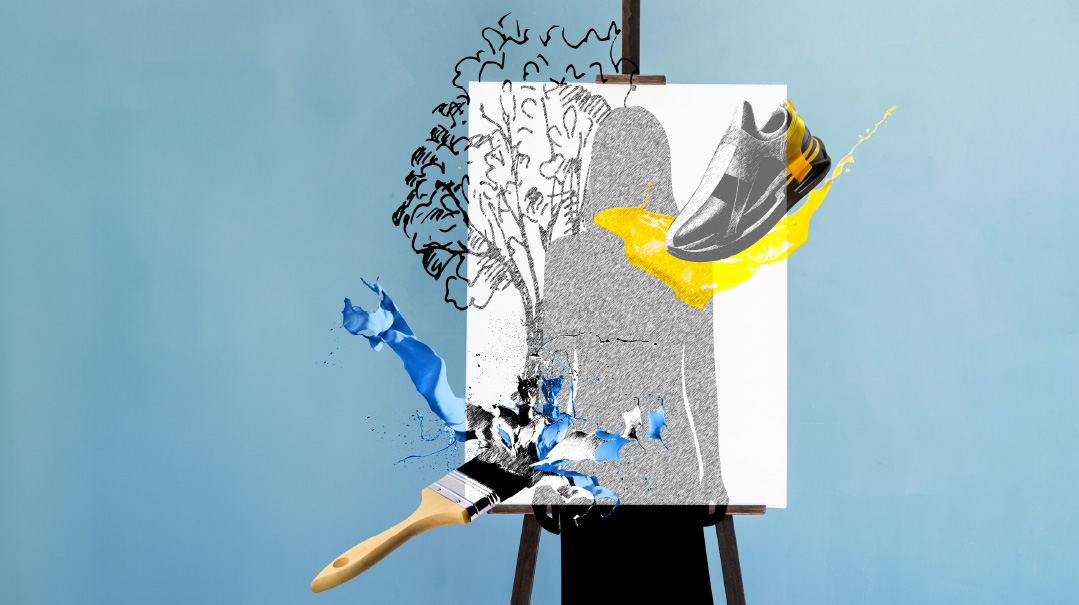Gallery
| June 27, 2023That day she drew a pigeon in a cage. The bars were thick and wide. And the pigeon’s feathers beautiful. Stifled potential. Sounded familiar.

Sometimes, Adi drew a large oak tree. She drew thick strong strokes, left the tree without leaves. So it was connected, yet searching.
Other times, a potted plant would appear on her canvas, a floral wall- papered background. So touché. Reminiscent of Bubby’s oatmeal cookies, steady, constant love.
And then came the figures. Bearded and stout, like the president of her shul and the rav down the block. Gangly and trending, smooth, crisp pleats, and silken hair — charming, but reminded her of a hollow vase. And the children — button noses, rosebud lips, dancing eyes. The story of youth and promise and innocence. Where anything is still possible. Nope. That was too far gone, Adi knew.
There it was, for all to see in plain view. If only anyone cared to know the inner workings of her soul.
Adi smoothed her hair, flashed a cheesy smile in the mirror. “Ugh, they’ll see right through me.” She adjusted her wristband and frowned. Why did things have to be so complicated?
“Taxi’s here.”
Adi sighed. “Coming, Ma.”
She slid into the seat next to her mother, and pursed her lips tight. This time there would be a good ending. Like all the stories in the books.
Surprisingly enough, Mrs. Leitner wasn’t dressed all in black. She wore a flowered yellow shawl and a bright smile. Still, you never know.
“Adira Rothman. What brings you here?”
She swallowed. “I’ve been hearing about your school’s great name, and how it truly gives each student opportunity to grow, and become the best they can be. All that sounded very interesting.” Check plus. Carefully memorized speech, well said.
“I’m glad to hear that. Yes, we offer a lot to our students. But let me ask you, Adira, what brings you here in the middle of your tenth-grade school year?”
So here it was. Inevitable, as always. So why did she feel like she was being punched in the stomach? “I’ve decided after a lot of thought that I would do better in a smaller school, broaden my horizons….”
Adi nodded at all the right times, answered all the right things, and left the office with a polite “Thank you for your time,” while the hurt and anger thrashed wildly beneath the surface.
Why did she think that this time would be different?
That day she drew a pigeon in a cage. The bars were thick and wide. And the pigeon’s feathers beautiful. Stifled potential. Sounded familiar.
It was as she was doling oatmeal into a plate that she realized it wasn’t about her. The constant rejections, the loneliness, the art and depth that bloomed in a place no one could reach. It was about society, about labeling and putting everyone neatly into a box. If you didn’t fit the bill, you didn’t belong. Just like that. Adi swished her oatmeal with her spoon.
“Stop messing with your food.” Breina glowered at her. “Breakfast’s supposed to be quick business.”
“Says who?”
Breina sighed heavily, as if to say some things are so basic it’s a pity to waste energy on explanation, even for a little sister.
So even when it came to breakfast she couldn’t toe the line.
“That neon one is nice.” Shimmy pointed.
Adi scrunched her nose. “Nobody wears neon sneakers. It’s weird. Look at the black ones, or the navy sneakers over there.”
Shimmy stamped his foot. “I want those. I want. I want!”
He was being ridiculous. How to explain to a five-year-old that his opinion was highly unclassy? Adi waved desperately to her mother. “Ma, over here, Shimmy’s giving me a tough time.”
Her mother smiled as Shimmy pointed at the neon sneakers, and Adi noticed that the weariness in her smile seemed very familiar.
Suddenly, she remembered the time she’d asked for a pet rabbit. Her mother’s tired smile had been her answer then. And it was her answer now as well.
So she was a complicated version of neon sneakers. Oh.
They returned from the shopping trip, Shimmy stomping behind them, angry at the neon sneakers that had been left behind.
“You think they’ll call back today?” Adi asked.
Her mother sighed. “You never know.”
“But Ma, I must get into Ateres Leah. I heard that they really get today’s kids, and don’t push anyone into a narrow tight box like… like….”
“Adira, I know. I know about school, about the unfairness of it all. It’s okay. We’re doing our best now to get you into the school that will bring out your strengths.”
She swallowed hard. “I’m not dumb. I know the drill. They don’t want me because I’m different. Because I’m switching schools mid-high school so obviously there must be issues.” Adi’s eyes flashed angrily. “I’m sick and tired of being put into a box, where society labels me second-rate. Why? Because I don’t fritter away my time yapping on the phone and I’m into art instead? Because I never went to camp and cannot stand hanging out at the ice cream shop? I don’t run after every silly trend, and suddenly I don’t belong?”
Her mother paused, stared into Adi’s wide, hurting eyes. “And who said society has labeled you right?”
Adira twisted her scarf around her finger. “Right.” Her tone was bitter. “I guess they all labeled me wrong. The entire world must have gotten it wrong.”
Adi knew she was being difficult, but she didn’t care.
Sunday afternoon, the perfect day for a birthday party.
The volunteer group at The Chavivi Center was going all out this time. There would be music, a chocolate fountain, games and gifts… the works. They were giving Michal, a ten year old with Down syndrome, a birthday party she would never forget.
Adi was putting the finishing touches on the table as her fellow volunteers were busy getting their charges settled and ready. She placed the chocolate fountain in the center of the table, alongside a tray of marshmallows, pretzels, and chocolate.
She frowned. There wasn’t enough chocolate for the number of kids who’d shown up. Oh well; she’d have to go buy more.
A few minutes later, Adi was scanning the aisles of the neighborhood grocery store. She found what she was looking for, paid, and left. She was nearly back at the center when she glanced at the package and let out a groan. It read 16 oz. and she needed at least 24. Oh well, it would have to do.
Later, after the party was over, Adi remembered the chocolate, how somehow there was plenty to go around. Either the company had labeled it wrong, or maybe the labeling meant nothing. Or somehow, the amount of chocolate in the package was just exactly the amount she needed.
At that moment, Shimmy came pounding in, and Adira stared at his navy-and-black sneakers. Boring, acceptable. She grabbed the mislabeled item, clenched it hard till her knuckles were white, as the conversation with her mother replayed in her mind.
“And who said society labeled you right?”
She had adamantly refused to accept that it was possible, thought herself doomed and written off by society’s forbidding glare. But they had gotten her all wrong. If chocolate, simple as it is, could prove different from what the company labeled it, what did that say about a complex human being? What did that say about her?
Whoever said she was labeled right?
Whoever said she ought to be labeled at all?
She was just Adira, intense and decisive and fun-loving. And decidedly unique.
That night, before bed, she drew a coffee mug, a sugar cube, and a chocolate bar. She left the chocolate bar clean and empty. No mislabeling this time.
The sunshine stole across her face as she checked the cordless phone next to her bed the next morning. There was a missed call from Ateres Leah.
(Originally featured in Teen Pages., Issue 967)
Oops! We could not locate your form.







